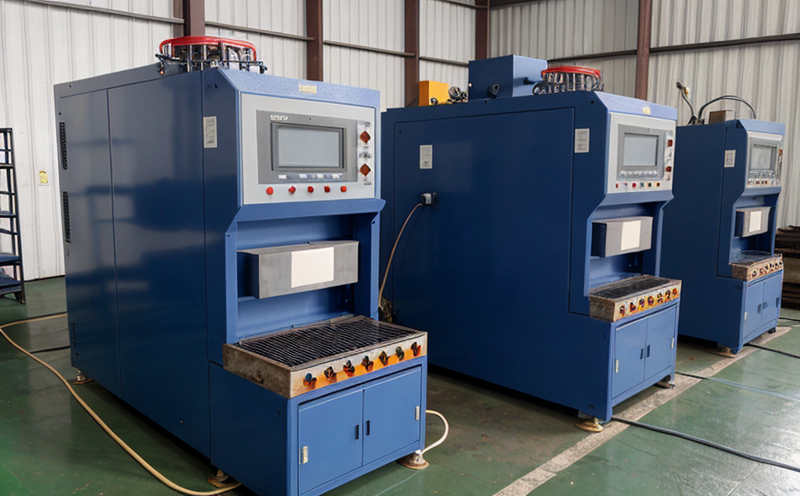ASTM D1250 Petroleum Density Testing for Input Quality
ASTM D1250 Petroleum Density Testing is a critical method used to measure the density of petroleum products. This testing ensures that raw materials and inputs meet stringent quality standards, which are essential in industrial manufacturing processes. The test is particularly important because it helps manufacturers understand the physical properties of their raw materials, ensuring consistency and reliability across production runs.
The ASTM D1250 standard provides a standardized procedure for measuring the true density of petroleum products at a specific temperature (usually 15°C). Density is one of the fundamental physical characteristics that help in identifying different types of petroleum. It also aids in understanding the behavior of these materials during processing, such as blending or transportation.
Quality managers and compliance officers rely on ASTM D1250 testing to ensure that the raw materials they purchase meet specified quality criteria. This is particularly important for industries like petrochemicals, refining, and chemical manufacturing where purity and consistency are paramount. The test results provide a reliable basis for decision-making in procurement processes, helping avoid costly errors or rejections.
In industrial manufacturing, precision in density measurement can prevent issues during downstream processing steps. For instance, incorrect density readings could lead to inefficiencies in blending operations or even quality defects in the final product. By adhering to ASTM D1250 standards, manufacturers can ensure that their processes are optimized and that they meet customer expectations.
The accuracy of ASTM D1250 testing is achieved through the use of precision instruments such as pycnometers or digital densitometers. These devices provide repeatable measurements that comply with international standards like ISO 3676, which further ensures reliability across different laboratories and jurisdictions.
Understanding the density of petroleum inputs also aids in sustainability initiatives by helping manufacturers minimize waste and optimize resource use. By ensuring accurate input quality, industries can reduce energy consumption during processing and improve overall efficiency.
Quality and Reliability Assurance
- Consistency: ASTM D1250 testing ensures that raw materials consistently meet the required density specifications. This consistency is crucial for maintaining product quality across production runs.
- Compliance: By adhering to international standards, manufacturers demonstrate compliance with regulatory requirements and industry best practices.
- Risk Management: Accurate testing helps in risk management by identifying potential issues early in the supply chain before they impact downstream processes.
Quality assurance is not just about meeting specified density values; it's also about ensuring that these values are repeatable and reliable. This consistency builds trust with customers and stakeholders, enhancing brand reputation and market credibility. The use of calibrated instruments and adherence to standardized procedures further reinforces the reliability of test results.
In terms of compliance, ASTM D1250 testing ensures that manufacturers can meet regulatory requirements set by bodies like the Environmental Protection Agency (EPA) or Occupational Safety and Health Administration (OSHA). These regulations often mandate strict quality control measures for raw materials used in industrial processes. By conducting ASTM D1250 tests, companies can demonstrate their commitment to environmental protection and worker safety.
Risk management is another key aspect of quality assurance. Early detection of density discrepancies allows manufacturers to address issues at the source rather than during more costly stages of production or after a product has been released into the market. This proactive approach helps minimize disruptions, reduces costs associated with rework or recalls, and enhances overall operational efficiency.
Environmental and Sustainability Contributions
The measurement of petroleum density through ASTM D1250 testing plays a significant role in environmental stewardship efforts within industrial manufacturing. By ensuring that raw materials meet specified quality criteria, this testing helps minimize waste generation during processing stages.
Accurate density measurements enable manufacturers to optimize their processes, reducing energy consumption and emissions associated with production activities. For example, knowing the exact density of a given petroleum input allows refineries to adjust their distillation processes more precisely, leading to higher yields and lower operational costs.
- Efficiency: Optimal use of raw materials reduces waste and improves process efficiency, contributing positively to sustainability goals.
- Emissions Reduction: By minimizing energy consumption during processing, manufacturers can significantly reduce greenhouse gas emissions associated with industrial operations.
In addition to operational improvements, ASTM D1250 testing supports broader environmental initiatives by promoting the use of cleaner technologies and practices within the industry. This aligns with global trends towards sustainable development and responsible resource management.
Moreover, the results from ASTM D1250 tests contribute valuable data for lifecycle assessment studies aimed at understanding the environmental impact of industrial processes. Such information is crucial for continuous improvement efforts that focus on reducing ecological footprints across all stages of product development and use.
Use Cases and Application Examples
- Petrochemical Manufacturing: In petrochemical plants, ASTM D1250 testing is used to ensure that feedstocks like crude oil or natural gas liquids have the correct density for efficient processing. This helps in optimizing plant operations by ensuring optimal flow rates and preventing blockages in pipelines.
- Refining Processes: Refineries rely on precise density measurements during various stages of refining, from initial cracking to final blending. These tests help ensure that intermediate products meet specific specifications before they are processed further or packaged for sale.
In the field of chemical manufacturing, ASTM D1250 testing is crucial for ensuring that raw materials like solvents or catalysts have consistent density values across batches. This consistency ensures product uniformity and reliability, which are essential for maintaining high-quality end products.
For lubricant manufacturers, accurate density measurements are vital for quality control purposes. Lubricants need to meet strict viscosity requirements based on their intended application (e.g., automotive engine oils or industrial gear oils). Density testing helps in achieving these viscosities by providing insights into the molecular structure of the oil.
In pipeline transportation systems, ASTM D1250 tests are conducted periodically to monitor changes in density as crude oil moves through long-distance pipelines. This monitoring ensures that there is no significant loss or gain in volume during transit, which could affect pricing arrangements between buyers and sellers.





